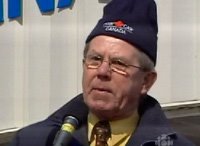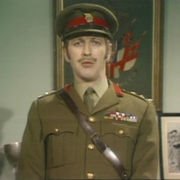Scroll down on the right and you'll see it.
[Left: Premier Danny Williams. Photo: Greg Locke/Current]
Check out this account from The Current online of an encounter between the president of the Conservative Party of Canada and some local senior Progressive Conservatives at the Tory convention in Gander last month.
The name is official.
sort of.
Update: Take a look at the Offal News take on this story as well.
I can add a bit of colour to Lono's comments, in the sense of background. As it turned out in June 1990, the task fell to me for co-ordinating the security and logistics details of two visiting first ministers during Meech Lake. I got the prime minister and the Ontario premier, David Peterson. Another guy in the office got McKenna and Grant Devine.
Now you have to bear in mind that this was during the course of the very heated debate in the House of Assembly. Emotions were running high and the Premier and the Prime Minister quite clearly didn't see eye-to-eye about very much of anything. Even at the level I operated on, which was several layers down from the grown-ups, the general approach we followed is the one to most people would expect. To the best of my knowledge, it's the approach pretty well any first minister's office has followed.
Your job as a staffer is to make things happen and to represent your boss, the office he holds and the province as a whole with as much professionalism and dignity as you can muster.
And hey...no matter how much you disagree with his policies, the guy is still the prime minister of the country or the Premier of Ontario. As they say in the army, even if you can't salute the man, salute the rank.
Mulroney came down, the trip went without a hitch and there was never - to the best of my knowledge - anything that would reflect badly on the Office of the Premier, the Premier himself and the province. Courtesy was the order of the day, even when the advance guy was being a complete ass about cameras in the legislature.
As an aside, the CBC television producer involved wound the guy up tighter than tight before he finally agreed to a request both knew was easy enough to accomplish. The problem was in the guy's tone. But that's another story.
 To get back to the point, in the little saga The Current lays out, one of the people involved is Tommy Williams, the premier's brother; the other was allegedly one of the Premier's senior staffers. Even though Tommy isn't on staff, people know who the heck he is and he really falls under the same sort of expectations as the staff. That is, unless his goal is to be like Jimmy Carter's doltish brother.
To get back to the point, in the little saga The Current lays out, one of the people involved is Tommy Williams, the premier's brother; the other was allegedly one of the Premier's senior staffers. Even though Tommy isn't on staff, people know who the heck he is and he really falls under the same sort of expectations as the staff. That is, unless his goal is to be like Jimmy Carter's doltish brother.If he acted the way he is alleged to have acted, then we have a serious problem. If people carry on this way when they represent the Premier we all look like schmucks.
We all get branded as boors.
There really isn't much chance that the staffers can work around the bosses' disagreements - public or private, real or imaginary - because the staffers are basically acting as boorishly as the grown-ups.
To make matters worse, when people representing the province act like horse's asses, you can imagine how little they really think of the province and its people.
If the Gander story is true, it wasn't the national Conservative party president who got told to off.
Nope.
By implication, we have all been put on notice:
This is Dannystan.







